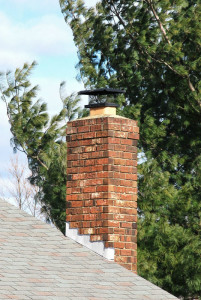Spring is known for its unpredictable weather, from heavy rains to strong winds – and even tornados! With the potential for extreme weather conditions, it is important to take steps to protect your chimney – as well as the rest of your home – from storm damage.

One of the best ways to protect your chimney against damage is by trimming any overhanging branches or limbs. Doing this can keep falling broken boughs from falling onto your roof and chimney in the event of a storm, saving you money on potential repairs and helping to keep you and your family safe.
Common problems caused by overhanging tree limbs
Tree limbs that extend over your roof and chimney can cause a number of problems for your fireplace system. Below are some of the most common issues associated with tree limbs and chimneys.
Storms, falling limbs, and insurance
Spring and summer storms are known for bringing thunder, lightning, rain, hail, and strong winds. While all of these forces may not be damaging to your chimney, they can cause nearby tree limbs to split, crack, break, and fall. Unfortunately, if a falling tree branch damages your chimney, your homeowner’s insurance may not cover the cost of the damages.The cost of damage to your roof or chimney caused by falling tree limbs can be denied on the basis that nearby limbs that were at risk of breaking or falling were not removed. To prevent damage to your chimney – as well as insurance claims being denied – trim or prune any branches that are too close to or over your roof or chimney.
Chimney blockages
A tree with branches over your chimney may provide welcome shade on warm days, but it can also drop debris down into your chimney. Small twigs, branches, leaves, and seeds such as acorns can all fall down onto your roof and chimney; while most homes have chimney caps, a missing or damage chimney cap can allow this debris to fall directly into the flue. Debris in the flue can dry out, creating a fire risk, or block the flue completely, causing smoke and gas to back up into your home.
Animal entry
Trees that hang over the chimney can give animals like squirrels and raccoons direct access to your chimney. Trimming back branches away from the chimney – as well as the rest of the roof – can make it more difficult for animals to gain access to the chimney; this, along with additional deterrents like chimney caps, can help keep animals out of your chimney structure.
Trees and chimney drafting
Limbs or trees that are too close to the chimney can cause drafting issues, especially if they are taller than the chimney structure. To prevent drafting problems from occurring, all trees within 10 feet of the chimney should be at least 2 feet shorter than the height of the chimney. This allows the chimney to draw in enough air to properly feed the fire and draft smoke and gas out.Tree limbs over and around the chimney can cause a number of issues. If you live in and around Shreveport, LA, contact New Buck Chimney Services today for more information on the problems that surrounding tree limbs can cause.
